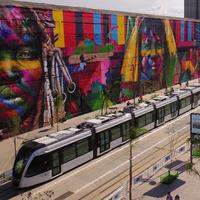Rumo à Alemanha
Towards||
Nach Deutschland gehen
Toward Germany
Hacia Alemania
ドイツに向けて
前往德国
Logo antes da viagem, o pessoal do meu trabalho começou a fazer uma infinidade de perguntas: "Quando é mesmo que você vai sair de férias?
Logo|||||||||||||infinity|||When||again|||||on|
Kurz vor der Reise begannen die Leute in meiner Arbeit, eine Menge Fragen zu stellen: "Wann fährst du wirklich in den Urlaub?
Right before the trip, my work people started asking a multitude of questions: "When are you really going to go on vacation?
Para onde você vai?
Wohin gehst du?
Where are you going?
Vai viajar com seu marido?
Reisen Sie mit Ihrem Mann?
Are you going to travel with your husband?
E vão ficar quantos dias lá?
Und wie viele Tage wirst du dort sein?
And how many days will they stay there?
Quais cidades vão visitar?"
which|||
Welche Städte wirst du besuchen?"
What cities are you going to visit?"
E assim vai.
And|and so|
Und so geht es.
And so it goes.
Comentei que dessa vez atravessaríamos para a Alemanha de balsa.
I mentioned||this time||we would cross|||||ferry boat
Ich bemerkte, dass wir dieses Mal mit der Fähre nach Deutschland übersetzen würden.
I commented that this time we would cross to Germany by ferry.
Também disse que minha intenção era sair de Copenhague às 3 da tarde para pegar a balsa das 5:15.
Ich sagte auch, dass meine Absicht sei, Kopenhagen um 15:00 Uhr zu verlassen, um die Fähre um 17:15 Uhr zu nehmen.
I also said that my intention was to leave Copenhagen at 3 pm to catch the 5:15 am ferry.
Ainda bem que eu fiz esse comentário, pois fiquei sabendo que eu deveria sair de Copenhague mais cedo, porque a rodovia estava em obras e poderia ter engarrafamento.
||||||comment||||||||||||||highway||Thank goodness|works||||traffic jam
Ich bin froh, dass ich diesen Kommentar abgegeben habe, weil ich gehört habe, dass ich Kopenhagen vorzeitig verlassen musste, weil die Autobahn gebaut wurde und es zu einem Stau kommen könnte.
Thankfully I made that comment, because I learned that I should leave Copenhagen earlier because the highway was under construction and could have traffic jam.
No dia da viagem saí do escritório às 14:15.
||||||office|
Am Tag der Reise verließ ich das Büro um 14:15 Uhr.
On the day of the trip I left the office at 2:15 pm.
As malas já estavam no bagageiro do carro.
|||||trunk||
Die Koffer waren bereits im Kofferraum des Autos.
The bags were already in the trunk of the car.
Busquei meu marido e fomos rumo ao sul da Dinamarca, onde pegaríamos a balsa.
I picked up|||||toward||||||would take||ferry boat
Ich suchte meinen Mann und fuhr nach Süden nach Dänemark, wo wir die Fähre nehmen würden.
I looked for my husband and headed south to Denmark where we would catch the ferry.
Dito e feito.
Said||done
Gesagt, getan.
No sooner said than done.
Realmente pegamos muito trânsito no meio do caminho.
|"hit"||||||
Wir haben wirklich viel Verkehr auf dem Weg.
We really got a lot of traffic in the middle of the road.
No trecho que estava em obras, o trânsito estava engarrafado.
No|section||||||||backed up
In der Strecke, die sich im Bau befand, war der Verkehr in der Luft.
In the stretch that was under construction, the traffic was bottled up.
Sabe, aquele tradicional 'anda um pouquinho e pára', ou seja, primeira e segunda marcha o tempo todo.
|||go|||||||first|||gear|||
Sie wissen, dass der traditionelle "ein bisschen geht und anhält", das heißt, der erste und der zweite Gang die ganze Zeit.
You know, that traditional one 'walks a little bit and stops', that is, first and second gear all the time.
Pelo menos o trânsito não estava completamente parado.
Zumindest wurde der Verkehr nicht vollständig gestoppt.
At least the traffic was not completely stopped.
Chegamos na balsa no horário certinho.
|||in||right on time
Wir kamen zur richtigen Zeit auf der Fähre an.
We got on the ferry at the right time.
Foi sorte.
|It was luck.
Es war Glück.
It was luck.
Se eu tivesse saído de Copenhague às 15 horas, eu teria perdido aquela balsa e teria que comprar um novo bilhete.
|||left||||||||||||||||
Wenn ich Kopenhagen um 15 Uhr verlassen hätte, hätte ich die Fähre verpasst und musste ein neues Ticket kaufen.
If I had left Copenhagen at 3 pm, I would have missed that ferry and had to buy a new ticket.
E um novo bilhete só de ida iria me custar 500 coroas (em torno de 65 euros).
||||only||one-way|would|||crowns||||65 euros
Und ein neues Flugticket kostet mich 500 Kronen (rund 65 Euro).
And a new one-way ticket would cost me 500 crowns (around 65 euros).
Isso é bem caro, para uma travessia de 45 minutos.
||||||crossing||
Dies ist für eine 45-minütige Überfahrt sehr teuer.
This is quite expensive for a 45-minute crossing.

